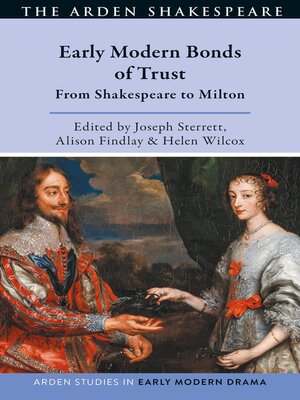Early Modern Bonds of Trust
ebook ∣ From Shakespeare to Milton · Arden Studies in Early Modern Drama
By Alison Findlay

Sign up to save your library
With an OverDrive account, you can save your favorite libraries for at-a-glance information about availability. Find out more about OverDrive accounts.
Find this title in Libby, the library reading app by OverDrive.



Search for a digital library with this title
Title found at these libraries:
| Library Name | Distance |
|---|---|
| Loading... |
The concepts of trust and risk provide important insights into the social and cultural life of early modern England but remain relatively unexplored in early modern literary studies.
This collection addresses that gap by exploring a wide range of literary genres and texts including comic drama, lyric verse, emblem books, ledgers, wills, polemical prose and religious epic. Contributors explore issues of personal trust through the faith and lies that characterize Shakespeare's sonnets, Donne's sermons and Milton's Paradise Lost. Following the idea of trust and risk into community brings us to a discussion of The Merry Wives of Windsor, the spiritual trust of faith communities and the network of relationships that are traceable though surviving records of women's wills. Following this progression outwards from the personal to the communal, the final essays in the collection consider the role of institutional trust, specifically the early modern obsession with credit in its various guises. The Merchant of Venice, Volpone and The Winter's Tale act as illustrative examples of credit's significance for understanding trust and risk in the early modern period. Taken together the range of texts and genres considered reveal new insights into early modern English literature and its socio-economic context.
This collection addresses that gap by exploring a wide range of literary genres and texts including comic drama, lyric verse, emblem books, ledgers, wills, polemical prose and religious epic. Contributors explore issues of personal trust through the faith and lies that characterize Shakespeare's sonnets, Donne's sermons and Milton's Paradise Lost. Following the idea of trust and risk into community brings us to a discussion of The Merry Wives of Windsor, the spiritual trust of faith communities and the network of relationships that are traceable though surviving records of women's wills. Following this progression outwards from the personal to the communal, the final essays in the collection consider the role of institutional trust, specifically the early modern obsession with credit in its various guises. The Merchant of Venice, Volpone and The Winter's Tale act as illustrative examples of credit's significance for understanding trust and risk in the early modern period. Taken together the range of texts and genres considered reveal new insights into early modern English literature and its socio-economic context.







